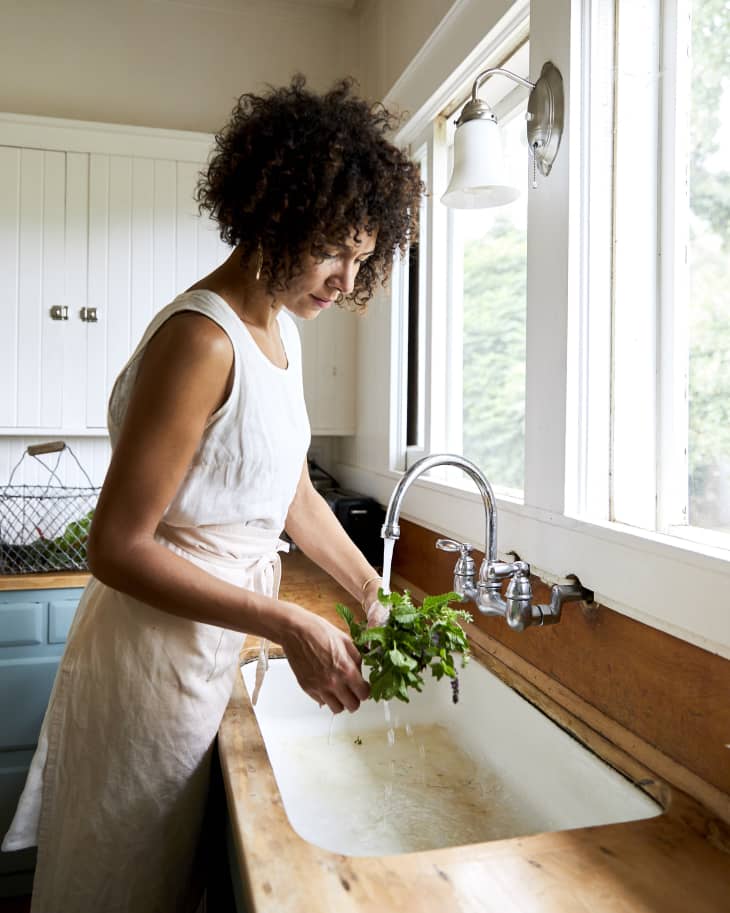Everything You Need to Know About Washing, Prepping, and Storing Fresh Herbs
I find that I am a better cook when my kitchen is stocked with fresh herbs. There’s just something about them that always gives me a little more inspiration, whether I am following a particular recipe or simply adding a little sprinkle to whatever I may be creating for a bolt of flavor and freshness. Salads are more vibrant with loads of herb leaves and braised dishes taste brighter with a hit of chopped herbs just before serving.
But the key to using fresh herbs is keeping them, well, fresh. Buy a big bunch of parsley or basil and toss it in the fridge, and it will more than likely be wilted and sad within just a few days. Not only is it a waste of food, but it’s also a waste of money. Don’t worry — storing fresh herbs comes down to four factors (moisture, light, oxygen, and temperature), so you can extend their life up to 3 weeks.
Why Fresh Herbs Go Bad in the Fridge
Fresh herbs go bad because of a number of different factors. Too much moisture on the leaves can turn them slimy, while too little moisture can cause them to dry out. Also, excess light can cause fresh herbs to yellow, and excess oxygen (and sometimes very cold temperatures) can turn them brown.
The key is to find the herb’s happy place among these four factors: moisture, light, oxygen, and temperature. If you follow these methods, your fresh herbs will last about two to three weeks, but maybe even longer. (I have a bunch of thyme stored in my refrigerator from late March that’s still going strong.) Here’s what you need to know.
Why You Should Wash and Dry Herbs Before Storing
All fresh herbs should be washed before using and storing. Rinse the whole bunch under cool running water and dry them well — whether you’re after a sprig or a giant handful, it will be ready for you whenever you need it.
How to Wash and Dry Fresh Herbs
Always wash fresh herbs with cool water and dry them properly to ensure there won’t be excess moisture lingering that could lead to decay. You can simply rinse the bunch under the sink and lay it out in a single layer on paper towels to dry, or try taking the herbs for a ride in a salad spinner.
Why You Should Know Which Kinds of Herbs You’re Dealing With
Not all fresh herbs are created equally; they actually fall into two categories depending on their stems and leaves. Do they have tender stems and soft leaves, like cilantro or mint? Then they are soft herbs. If they have hardy, woody stems and leaves, like rosemary or thyme, they are hard herbs.
What’s the Difference Between Soft and Hard Herbs?
Soft herbs, like basil, cilantro, and parsley, have tender stems and leaves, while hard herbs, like rosemary, thyme, and sage, have woody stems and firmer leaves. These differences have an impact on how you store and cook with them. It’s also an indicator of when herbs are in season. Soft herbs come into season in the spring and fall, while hard herbs often have a season that extends well into early to mid fall.
How to Store Soft, Tender Herbs in the Fridge
Treat soft herbs like a fresh bouquet of flowers. Fill a glass with cool water, trim the ends of the stems, and then place the bunch in the glass. Change the water every couple of days to keep it fresh. Your basil bouquet should be left out on the counter at room temperature, as its leaves will turn black if refrigerated.
But all others should be stored in the refrigerator covered loosely with a plastic bag, which helps the herbs retain moisture in the dry environment of the refrigerator and keep too much oxygen from browning the leaves. They’ll last a week or two stored this way.
The Most Common Soft Herbs
- Parsley
- Cilantro
- Dill
- Basil
- Tarragon
- Mint
How to Store Hard, Woody Herbs in the Fridge
Hard herbs require a slightly different approach. Instead of sticking them in a glass of water, wrap them loosely in a damp paper towel. Store the bundle in an airtight container or resealable bag in your crisper drawer. The paper towel keeps the herbs just moist enough so they don’t dry out, and the container or resealable bag keeps oxygen out. I’ve found they last at least 10 days, if not a few weeks, when stored this way.
The Most Common Hard Herbs
- Rosemary
- Thyme
- Chives
- Sage
- Oregano
What is your favorite way to use up herbs? Tell us in the comments below!
